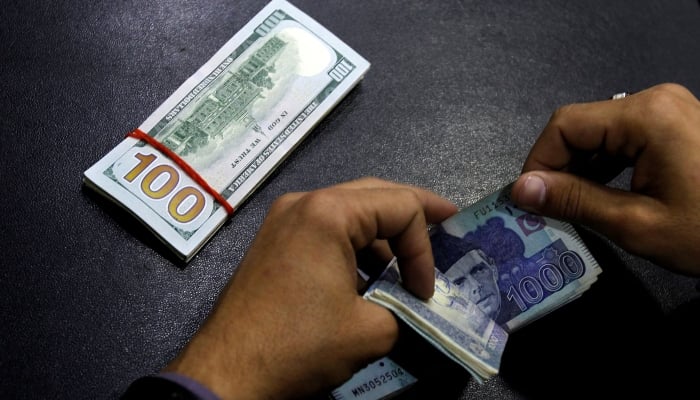Pakistan records 10-year-high current account surplus
November surplus marks 111% month-on-month growth, says central bank data
December 18, 2024

- Pakistan posts $729 million current account surplus.
- Surplus reflects strong remittances, reduced trade deficits.
- November marks the 4th consecutive month of surplus.
KARACHI: Pakistan posted its highest current account surplus in nearly 10 years in November, buoyed by a reduction in the trade and services deficits as well as lower interest and dividend repatriations, The News reported on Wednesday.
The country recorded a current account surplus of $729 million in November, the highest level since February 2015. This compares to a surplus of $346 million in the previous month and a deficit of $148 million in November 2023, the central bank data showed on Tuesday.
November marked the fourth consecutive month of surplus. Over the first five months of the fiscal year 2025, Pakistan posted a current account surplus of $944 million, in contrast to a deficit of $1.67 billion during the same period last year.
The substantial month-on-month surplus of 111% in November was attributed to a reduction in the trade deficit, which decreased by 14% month-on-month to $1.361 billion, while the services deficit fell by 43% to $152 million.
Additionally, the primary deficit dropped by 7% on a monthly basis to $843 million in November. Goods imports decreased by 10% to $4.136 billion, while services imports fell by 13% to $828 million.
Total goods exports rose by 3% year-on-year to $2.775 billion but fell by 8% month-on-month in November.
Remittances experienced a 5% decline MoM but increased by 29% year-on-year, reaching $2.9 billion in November. The cash sent home by Pakistani citizens working abroad rose by 34%, totaling $14.8 billion in the five months leading up to November compared with the same period last year.
This improvement follows the country’s crackdown on unofficial buying and selling of dollars.
“The current account surplus improved due to a notable reduction in the trade and services deficit, coupled with decreased interest and dividend repatriations for the month,” said Awais Ashraf, the director research at AKD Securities Limited.
“Additionally, a decline in remittances was offset by an increase in personal transfers in November,” Ashraf added.
The latest balance of payments data was released after the State Bank of Pakistan (SBP) cut its key interest rate by 200 basis points to 13% for the fifth consecutive time this year. This brings the total reduction to 900 basis points since June 2024.
During an analyst briefing after the monetary policy meeting, SBP Governor Jameel Ahmad projected that Pakistan will post a significant current account surplus in November, driven by improved remittances and stronger export performance.
The SBP forecasts the current account deficit to fall within the lower bound of the projected 0-1% of GDP for FY25.
According to Ahmad, there is an increasing momentum in remittances, with the trend for the first two weeks of December surpassing that of previous months.
Finance Minister Muhammad Aurangzeb anticipates that remittances would reach an all-time high of $35 billion this year, up from $30 billion last year. This growth is supported by a narrowing gap between interbank and open market exchange rates, as well as favourable policies.
Regarding external repayments, the governor said that out of a total payable amount of $26.1 billion, $10.4 billion has already been paid or rolled over. The remaining debt repayment for the fiscal year, excluding planned rollovers, stands at $5 billion.
Ahmad emphasised that the inflows expected in the third quarter of FY25 from official channels would roughly equal the outflows of $2 billion. Consequently, any intervention by the central bank in the interbank market will aid in building forex reserves.
He anticipates that foreign exchange reserves will exceed the level of $13 billion by the end of June 2025.
APP adds: Meanwhile, in a press statement issued by the PM House, Prime Minister Shehbaz Sharif expressed satisfaction over achieving a record current account surplus in November.
“For the first time in 10 years, Pakistan’s current account surplus reaching $729 million in November 2024 is extremely encouraging for the national economy,” he said.
He highlighted that cut in the policy rate by the SBP, gradual decline in inflation rate and increase in the current account surplus were clear evidence of the government’s positive economic policies.
“Pakistan’s position in the international economic market will strengthen with record increase in the current account surplus,” he added.
He noted that the increase in current account surplus would also increase the local and foreign investor’s confidence in Pakistan’s economy.
Shehbaz also extended appreciation to the finance minister, Minister of State for Finance Ali Pervaiz Malik and the government’s economic team for their tireless efforts.
Separately, chairing a cabinet meeting, the prime minister said the central bank’s announcement of cut in the interest rate by 2% to 13% would help boost investment in the country and stimulate the economic growth.
“Taking advantage of the good news on economic front, we should first promote domestic investment, as a result the foreign investment will automatically come to the country,” the prime minister said.
Addressing the persistent challenge of polio eradication, the prime minister regretted that while the polio virus had been nearly eradicated worldwide, Pakistan still faced obstacles in becoming a polio-free country.
He stressed the need to overcome these challenges and reaffirmed the government’s commitment to eliminating the disease.
Shehbaz also expressed deep sorrow over the tragic loss of Pakistani lives in the recent boat capsizing incident near Greece. Welcoming the recent positive indicators, the prime minister noted that the reduced policy rate would provide relief to businesses and investors.
He further highlighted that the inflation rate had dropped to its lowest level since 2018, a significant development for the economy.
Shehbaz emphasised the importance of promoting local investment and announced that the government had completed a home-grown economic plan, which will be formally unveiled in a special event soon.











